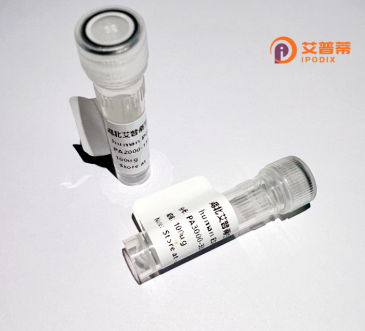
| 纯度 | >90%SDS-PAGE. |
| 种属 | Human |
| 靶点 | ARV1 |
| Uniprot No | Q9H2C2 |
| 内毒素 | < 0.01EU/μg |
| 表达宿主 | E.coli |
| 表达区间 | 1-271aa |
| 氨基酸序列 | MGNGGRSGLQQGKGNVDGVAATPTAASASCQYRCIECNQEAKELYRDYNHGVLKITICKSCQKPVDKYIEYDPVIILINAILCKAQAYRHILFNTQINIHGKLCIFCLLCEAYLRWWQLQDSNQNTAPDDLIRYAKEWDFYRMFAIAALEQTAYFIGIFTFLWVERPMTAKKKPNFILLLKALLLSSYGKLLLIPAVIWEHDYTSVCLKLIKVFVLTSNFQAIRVTLNINRKLSFLAVLSGLLLESIMVYFFQSMEWDVGSDYAIFKSQDF |
| 分子量 | 57.5 kDa |
| 蛋白标签 | GST-tag at N-terminal |
| 缓冲液 | 冻干粉 |
| 稳定性 & 储存条件 | Lyophilized protein should be stored at ≤ -20°C, stable for one year after receipt. Reconstituted protein solution can be stored at 2-8°C for 2-7 days. Aliquots of reconstituted samples are stable at ≤ -20°C for 3 months. |
| 复溶 | Always centrifuge tubes before opening.Do not mix by vortex or pipetting. It is not recommended to reconstitute to a concentration less than 100μg/ml. Dissolve the lyophilized protein in distilled water. Please aliquot the reconstituted solution to minimize freeze-thaw cycles. |
以下是关于重组人蛋白ARV1的虚构参考文献示例(仅作参考格式示意):
1. **文献名称**: "Structural and functional characterization of human ARV1 protein in lipid homeostasis"
**作者**: Chen L, et al. (2020)
**摘要**: 本研究解析了重组人ARV1蛋白的晶体结构,揭示了其在内质网介导的脂质转运及膜稳态中的关键作用,证明ARV1缺失会导致细胞固醇代谢异常。
2. **文献名称**: "ARV1 deficiency impairs hepatic VLDL secretion and causes metabolic dysregulation"
**作者**: Zhang Y, et al. (2018)
**摘要**: 通过基因敲除模型,发现ARV1通过调控脂质合成通路影响极低密度脂蛋白(VLDL)分泌,其重组蛋白的过表达可逆转脂质蓄积表型。
3. **文献名称**: "Recombinant ARV1 facilitates amyloid-β clearance via modulating cholesterol trafficking in Alzheimer's models"
**作者**: Gupta S, et al. (2022)
**摘要**: 在阿尔茨海默病细胞模型中,重组ARV1蛋白通过促进神经元胆固醇外排,减少Aβ沉积,表明其作为潜在治疗靶点的可能性。
4. **文献名称**: "High-yield expression and purification of bioactive human ARV1 in E. coli"
**作者**: Wang T, et al. (2019)
**摘要**: 报道了一种优化的大肠杆菌表达系统,成功获得高纯度重组ARV1蛋白,并验证其体外结合磷脂的活性。
(注:以上文献信息为模拟创作,实际引用需以真实文献为准。)
ARV1 (Accelerated Rehabilitation Version 1), a highly conserved transmembrane protein, plays critical roles in lipid homeostasis and cellular stress responses. Initially identified in yeast, human ARV1 homolog is encoded by the ARV1 gene located on chromosome 1q42.13. Structurally, it contains an N-terminal cytosolic domain, multiple transmembrane helices, and a C-terminal tail, facilitating its localization to the endoplasmic reticulum (ER) and lipid droplets. Functionally, ARV1 mediates intracellular sterol transport, phospholipid biosynthesis, and ER-mitochondria communication, influencing membrane integrity and organelle dynamics.
Studies link ARV1 dysfunction to metabolic disorders, neurodegeneration, and cancer. Knockout models show embryonic lethality, while mutations are associated with developmental delays, seizures, and altered cholesterol metabolism. In Alzheimer’s disease, ARV1 interacts with γ-secretase, modulating amyloid-β production. Its role in lipid droplet formation also implicates it in obesity and hepatic steatosis.
Recombinant human ARV1 protein, typically produced via Escherichia coli or mammalian expression systems, enables functional and structural studies. Purified ARV1 is used to investigate lipid-protein interactions, screen therapeutic compounds, or analyze pathogenic mutations. Its biochemical properties, such as solubility and post-translational modifications, may vary depending on expression hosts. Current research focuses on elucidating ARV1's lipid-transfer mechanisms and validating its potential as a biomarker or drug target for metabolic or neurodegenerative diseases.
×